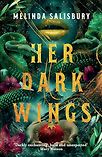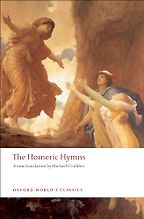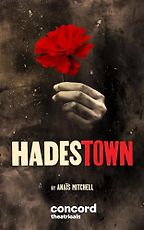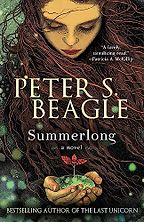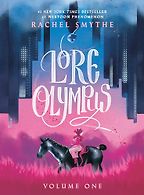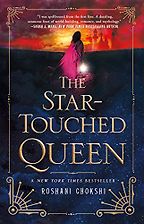Let’s dive in with your first choice – Homer’s ‘Hymn to Demeter,’ where we can find the most complete original telling. Persephone is abducted by Hades, god of the underworld; ultimately she returns to our world each year for six months, bringing us spring, and goes back to Hades for winter. Why is this myth still so popular?
I think there are many reasons. The rise of a certain genre of fiction around it suggests that a lot of women are not against the idea of being whisked away and turned into a queen – especially with the additional bonus of being able to come back for six months of the year. You only have to be adored and worshipped as the queen of Hell for six months, and then you get to come back to Earth and be a sort of princess of spring. It’s all very pretty and lovely.
What spoke to me about it is perhaps not what speaks to other people about it. I loved this idea of someone who everyone had goals and ideas for, determining her own path: Zeus wants her married and out of the way, her mother wants her to stay at home and just be a daughter forever, Hades obviously wants her to be his eternal bride and wife. But she carves out her own destiny in a way that simultaneously defies and satisfies everyone –it’s the ultimate democracy, no one is happy but everyone got something they asked for. Her mom gets her precious baby girl at home for six months of the year, Hades gets his wonderful bride for six months of the year, and Zeus gets her married off—but not entirely in the way he wants.
Goddesses often didn’t come out very well in Greek mythology, and I think Persephone is possibly the one who does best. That’s what really appealed to me about her story, and why I wanted to do a reimagining of it. There is an element of autonomy in her story, which isn’t there in a lot of Greek mythology. It’s very much the whim of the gods for everyone, mortals and other gods alike. She’s the standout figure who carves out such a high position for herself that she never has to be at anyone’s whim again.
Hades is quite whipped by her. He’s very much: ‘This is the one I want, I’ll do what it takes to keep her – whatever she says is fine.’ He softens for her. He becomes something new because of her as well.
So the appealing thing about this myth is the idea of a woman gaining power on her own terms, despite the fact that a lot of people are trying very hard to make sure she doesn’t get any power.
When you put it like that, the allure of the retellings seems obvious.
Yes. I mean, he does seize her very much against her will in the original, let me be very clear. It’s known as the ‘rape of Persephone’ for a reason. She’s very happily in a field, and he bursts out of the ground in a chariot, says ‘Mine!’, and pulls her back down to Hell with him – which she really isn’t thrilled about initially. So the fact that she negotiates away to a stronger position is good, but it doesn’t necessarily start out well.
Let’s talk about the first retelling on your list – which is actually the text from a musical. This is perhaps the best-known recent version: for anyone who’s missed it, what is Hadestown?
Hadestown is a musical. It is actually primarily about the story of Orpheus and Eurydice: they meet and fall in love, and in the original myth, Eurydice is bitten by a snake and dies. She goes down to Hades, and Orpheus follows. He’s the son of Calliope, one of the Greek muses, and has a little inherited musical power of his own; the music that he plays has a really alluring, compelling, sedative quality. He uses his power to go down into Hades to ask for his bride back, and in the myth Hades says no – once you’re dead there’s no reversing, no take-backsies.
And then Persephone says: ‘But he did come all the way down here, and that’s sweet – that’s love. And you know what else is love? You and I, babe, we’re love.’ So Hades says: ‘All right. But here’s the deal: you can’t look back. You have to just believe she’s behind you.’ So of course, when he gets to the gate and they’re almost through, he turns around. Back down to Hades she goes. Orpheus then has a really horrible sad life, and gets torn apart by the Maenads eventually.
Hadestown the musical is a Great Depression-inspired musical about Orpheus and Eurydice. They meet in a bar. Eurydice is this homeless girl who drifts from one place to the other. Orpheus is hanging out with Hermes. They meet, they fall in love, and then Hades shows up. And Hades in this iteration is the proprietor-manager, the CEO of Hadestown, a huge industrial complex which is offering lifelong employment to the down and outs and disenfranchised, and they’re earning their keep by building a wall. The idea is to build the wall to keep out all of the poor un-citizens. Stop me if this sounds familiar…
One of the things I loved most about this telling is that he and Persephone have been together for a long time. So this isn’t the current trendy, super horny for each other, getting together deal. This is a couple who have been doing this for a long time. Persephone, in this version, has developed a series of substance abuse habits, because she just needs something to stimulate her. Hades realises that she’s slipping away from him, and so starts to keep her in the underworld longer and longer, which means spring is getting shorter and shorter, causing really big problems on Earth – which is where the depression and deprivation comes from.
He’s sexy here, as Hades always is – for whatever reason, Hades is a sexy god – but in the musical, he’s repellent too. There are a few scenes where he really, really toes the line of abhorrent. And there’s a contract-signing scene with Eurydice, where it’s heavily implied that the contract is a signed-on-a-casting couch kind of deal, which Persephone is very aware of, and she’s jealous and vexed. And the whole Persephone-Hades relationship plays out in tandem with Orpheus and Eurydice, so you see how everything is happening simultaneously, and the cyclical nature of it all.
It sounds like complex storytelling.
Anaïs Mitchell, who wrote it, worked on it for ten years. She initially wrote it as a concept album where Justin Vernon from Bon Iver played Orpheus in these polyphonic beautiful songs, and she sang the female parts. And then it became an off-Broadway musical, then played at the National Theatre in the UK, then went to Broadway in the US, and it came back to the UK for its West End installation. I’ve loved it since the moment I saw it, and every time I see it, I notice new things. It’s really interesting to see how differently it’s played.
Hades at the beginning of the musical, is a very different guy to Hades at the end. By the end, he’s remembered how to love, and how to be loved, and he’s almost remembered how to trust. There’s a real element of hope to how it ends. I love the way that they are so done with each other, and all the minor aggressions they do to each other, the petty little hurts and the ways they niggle and get at each other. You never get to see that version of them – but of course, if you’ve been married to someone for millennia, it’s not going to be all “Take me now, big boy”. Reality will have set in. So it’s a really fresh take on a story that we think we all know so well.
We talked earlier about Persephone moving from victim to empowered – is she still empowered, at this point in their lives?
She has about the same amount of power, she just wields it very differently. In the myth, she wields her power quite softly. In Hadestown she’s aggressive, she’s mean, and she’s making it very clear she’s excited to get back to Earth for spring. When she gets there it becomes a big party. You can see the hurt in Hades’ face when she goes away, and also the hurt when she comes back. She says: ‘This place is disgusting. Why are the lights so bright? Why is it so freaking loud? This is a horrible place.’ And he says, ‘I built this for you.’ But she hates it.
So she still wields the power to control him, but she uses hurt to do it in Hadestown, as opposed to sexiness and youth and beauty in other versions of the story. He’s still the ultimate wife-guy for her, but she’s not a naïf anymore: she’s a woman now, with all the baggage that comes with it.
Let’s look at the first novelisation on your list. Please tell us about Summerlong, by Peter S. Beagle.
Summerlong ties in really well with Hadestown, because again it is a Hades and Persephone who have been married for a long time. In this version Persephone hasn’t grown older with Hades; they’ve stayed the ages they are in the traditional myth. So she’s still very young and beautiful and fresh, and he’s old and grizzly.
They interfere with a pair of mortals. There’s a couple in their late fifties, early sixties. They’re not married. They’ve just settled into a really good life together – they’ve had other lives before, and now they’re in their golden years, and they’ve found each other and settled into something that’s really good for them. It’s beautiful. And then the gods show up… which feels very classic Greek mythology.
First it’s Persephone, who in the book is known as Lioness, who comes to earth fleeing Hades; she’s had enough. She arrives and works as a waitress, and everyone notices her, and she starts to split their relationship up. And then Hades shows up looking for her. He has a thing with the woman, but he’s so clearly doing it to hurt Persephone/Lioness, and he makes it so clear that he has absolutely no interest in this woman – he does not make her feel good about herself. During the encounter she’s happy, but afterwards she feels her rage…
This sounds dark.
It’s a really horrible but really truthful story about the gods messing with people. It takes everything from Greek mythology and brings it into the present day, and shows the real-life damage they do by messing with mortals. And of course, at the end of the book they go back to Hades, reconciled, leaving everyone behind completely, knowing full well that in a matter of years, guess where they’re going to end up, and guess who’s going to be there… It’s really dark and really lovely.
It’s so beautifully written. I mean, this is Peter Beagle, the guy who did The Last Unicorn – he’s a beautiful writer. Although it apparently did not do very well – people were not thrilled with how dark it was, and how despite being speculative in the extreme, it was, in a way, un-fantastical. It deals with the mundanity of attraction and aging, and the damage people can and will do to each other to feel young, to feel wanted, to feel desire at its grubbiest. It’s the opposite of this trend of books where desire is the driving force behind things, with a purity to it: this is desire as a destructive force, a weapon, which changes things.
It works so well. I read it just after the first time I saw Hadestown, and I wanted to tell people who liked the musical: try this book, because the vibes are not dissimilar. It’s gods paying big games for small prizes, with people who can’t actually afford to be playing at all.
It’s interesting to see these characters and stories in a contemporary setting, and how that changes their feel. Your own retelling is set in the modern day. Tell us a bit about Her Dark Wings.
It’s a story about a seventeen-year-old girl called Corey who, unbeknownst to her, is the daughter of the goddess Demeter. Demeter ditches her on this island to hide her from the other gods. In this world, Hellenism became the dominant religion instead of Christianity; by the time the story starts, it’s faded out to the degree that Christianity has for a lot of people now. They celebrate the big-hitter festivals, and for funeral rites and weddings they follow the old scripts, but by and large most people don’t bother with it. So Corey has no idea who she is.
Her mother has hidden her on this island. She’s chosen it because of its proximity to the underworld, knowing that the other gods find Hades gross and disgusting and will avoid anything underworld-related. The proximity of this island to an entrance to Hades is the perfect shield. No one is going to go near it—until Hades, the idiot boy, senses that there’s a god nearby.
Hades becomes aware that she’s there, they kiss, and then that just opens a whole – well, not a literal Pandora’s box, but something not dissimilar to Pandora’s box of horrors. Because now suddenly Hermes is aware that she exists. Hades says: ‘Forget about me. You didn’t see anything, this never happened.’ But when terrible things happen to Corey’s friend Bree, the story really begins from there.
How did you come to choose the Persephone myth?
I didn’t plan to write a Hades and Persephone story at first. I wanted to write something in the Greek world – that was where my tastes were at the time, probably because I was spending a lot of time listening to the Hadestown album – but I really wanted to write a Medusa story, giving her agency. I couldn’t quite nail it. I couldn’t quite get the voice, or find a way into the story.
I went to a workshop with Madeline Miller, the author of Song of Achilles and Circe. I realised halfway through the class that maybe it should be Persephone I was writing about. I’ve always had a secret affinity with Persephone. My birthday is the 23rd of September, and that’s often the first day of autumn, the day that she’s going down into Hell is the day I was born.
When I write stories, it happens in a strange way. I normally get images first, and I don’t know what the images relate to. So for this one, I had the image of a girl in a white dress floating face down; I had an image of a daffodil; and I had an image of an island. So there were these three specific images, and I knew the story would come – and when I knew I wanted to write about Persephone, I had a moment of realisation: ‘That’s it. That’s the story.’
It’s not about Persephone as we know her: it’s about when she was Corey, when she’s a girl who likes to garden. It’s about how she becomes Persephone. The girl lying face down became Bree, her best friend, who stole her boyfriend and left Corey in a really dark, desperate, horrible place. The island from my image became the island they lived on, but also the manifestation of the underworld, and the island that the oracle Hecate lives on too… It all just all came together. This always happens for me: once it does come together, it comes together properly, but for a while it is like being a medium and just trying to channel the images and connect the dots.
Let’s talk about a graphic novel next: please introduce us to Rachel Smythe’s Lore Olympus.
This is absolutely wonderful. I started reading it when it was a web comic. I think all writers probably do this: when you do have an idea and you get really stuck on it, you look to see if anyone else has already done it, because you need to know. I saw someone had made this modern retelling of the Hades and Persephone myth – oh no! – but then I started reading, and it was fine, because it’s very different to mine. Oh my god, it’s amazing. It’s very horny – it is one of the sexy retellings. But it’s so deep and so full of agency, and it touches on some really dark themes as well.
Here Hades is a corporation, but it’s very different to Hadestown. People that work there are generally having a good time. The souls all get stuff to do, and there are nightclubs, and it’s fun. Hades meets Persephone at a party. She’s snuck out of her mum’s place and gone to a party with Artemis and Hestia, and she gets super drunk. All the boys are saying: ‘Who is she? She’s beautiful.’ She gets drunk and passes out, and Hades takes her home and just cares for her. They form this really long friendship where he will do anything for her, but she has to go on this journey of self discovery first.
She has really gross encounters with Apollo, and then he gets called out. It tackles heavy issues like sexual assault and broken marriages, in a really modern and accessible way. And it’s addictive to read.
I assumed, when I saw that those themes were present, that they came from the Hades-Persephone relationship.
Not at all. He absolutely worships her, he couldn’t even give her a hard look. He does have real issues – big daddy issues because of Cronus, and issues with the way he’s treated by the other gods. That’s interesting to me, because I did the same thing in Her Dark Wings before I’d read this – exploring what it would be like to be ostracised because of the role you play. In Ancient Greece, people wouldn’t say ‘Hades’. They would use epithets for his name instead, because they wouldn’t want to draw his attention. Imagine what a psychological number that would do on you, if you are so reviled just for doing your goddamn job – which, by the way, you didn’t choose. You picked a straw, and then suddenly everyone realised that your job is amazing; that you have so much power, and every person in the world is going to end up coming to you. And, technically, you would have a massive army of the dead should you choose to unleash it, so maybe everyone should just be a little bit nicer to you?
The Hades in Lore Olympus would never. He would never. He is a good man.
What is it about the god of the Underworld being nice that’s such a heart-melter? Because it is.
Yes. Death is scary and death is forever. It’s interesting how with Christianity, we moved on from this neutral idea of the place you go when you die to the idea that there’s two places: one is very good, one is very bad. And the guy who’s in charge of the bad place, oh, he’s terrible – which again, for Hades, just really adds to the propaganda. A whole religion where he’s the worst possible thing you can imagine.
Justice for Hades! Let’s look at one last retelling, your final choice: please tell us about The Star-Touched Queen by Roshani Chokshi, where the story of Persephone and Hades meets Indian mythology.
This is a really fresh take, a whole different angle –it’s more of a homage than a direct retelling, taking the core elements of the myth.
It’s about a girl called Maya. She is cursed, and she’s an outcast because of it. And then she overhears in a conversation that her father is going to give her away to a rebel leader in marriage, and she plans to escape, but her father says: ‘No, you do have to marry this strange guy. But also, we don’t want this going ahead, so actually you’ve got to un-alive yourself before the marriage.’ Then at her wedding she meets a new boy called Amar, and she picks him – she marries him instead.
Unbeknownst to her, he’s the lord of an equivalent of the underworld, the king of the dead. So she becomes the queen of this kingdom. This is where it really deviates away from the myth: she goes off on her own story that doesn’t really connect to the myth at all. And then they come back together in the end, and she does become his queen.
These retellings come from such different angles, all different takes on the original Hades and Persephone myth.
It’s interesting how this same story keeps getting retold in different ways. There is a powerful man that represents something dark and dangerous and a little sexy. Death is horrible and terrible, but there is something alluring about it to a lot of people, whether you can admit that or not. And I wonder if that’s a lot of the attraction of Hades – the being, as opposed to the place – the idea that you could seduce death, you could make death fall in love with you. That’s the element we see throughout a lot of these stories.
Five Books aims to keep its book recommendations and interviews up to date. If you are the interviewee and would like to update your choice of books (or even just what you say about them) please email us at [email protected]
Five Books interviews are expensive to produce. If you've enjoyed this interview, please support us by donating a small amount.

